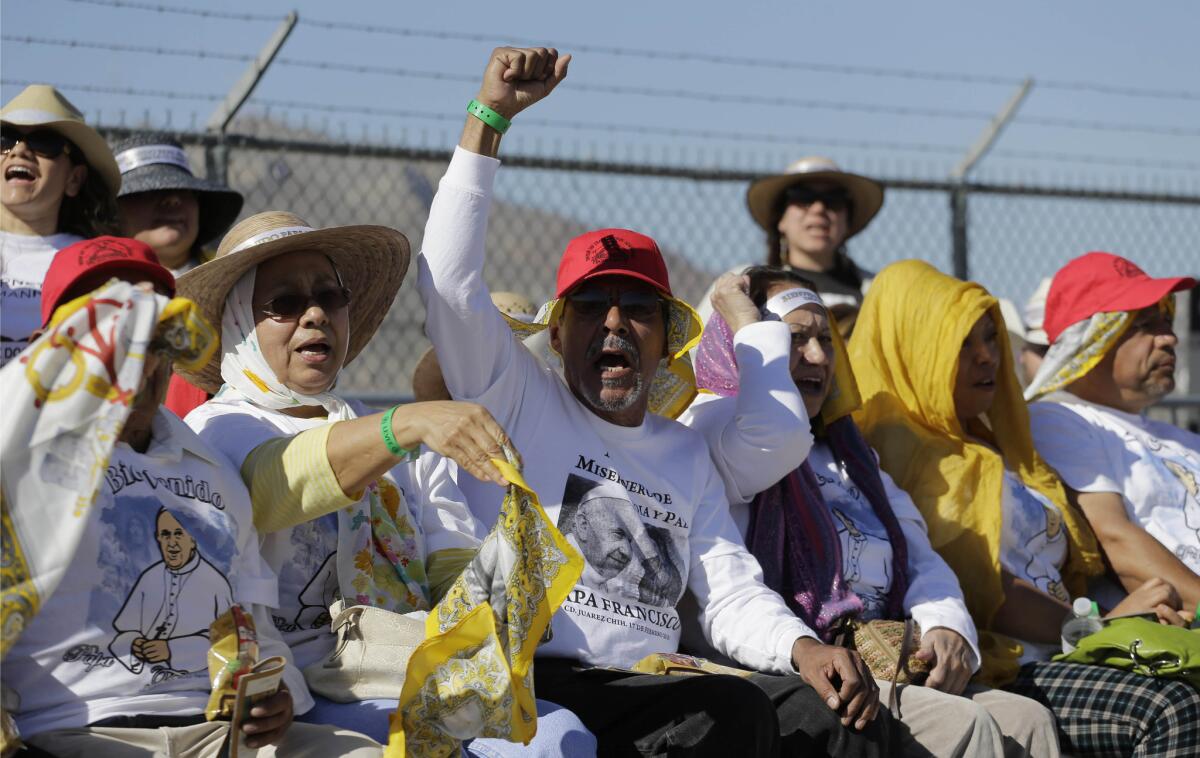Francis never crossed the border, but El Paso felt the pope’s presence

Migrants gathered in El Paso near the Rio Grande cheer as they wait to see Pope Francis appear on the other side of the border in Ciudad Juarez, Mexico, on Feb. 17.
- Share via
Reporting from El Paso — He never set foot on U.S. soil, never left Mexico. But the presence of Pope Francis could still be felt north of the Rio Grande.
Early Wednesday, Raul Gallegos, an Uber driver, was one of the few motorists cruising through downtown El Paso. He said he’d never seen the city so quiet on a weekday morning.
“It’s usually not like this. Usually there is a lot of traffic on the street,” he said.
He was headed to the Cordova Bridge linking El Paso with Ciudad Juarez, the last stop on the pope’s six-day visit to Mexico. Thousands of El Pasoans apparently had already crossed to attend an outdoor Mass celebrated by Francis near the border.
“I think it’s great for the community,” he said. “It’s especially good for Juarez. They’ve had a hard time with all the violence.”
A cross dangled from his rearview mirror as he drove on. “The money could have been spent worse, I guess,” he said.
He was referring to the cost of security, traffic control and other expenses incurred by El Paso — an estimated $1 million. Two public school systems shut down for the day and several roadways were closed to traffic. An estimated 50,000 people were expected to gather at the Sun Bowl stadium to watch a simulcast of the Mass.
On the Cordova bridge, volunteers from the Diocese of El Paso — which adopted the slogan “Two Nations, One Faith” — handed out bottled water and prayer cards to smiling pilgrims headed south. Usually a long line of autos would be stretching toward the bridge at 7 a.m. Not today. Although the bridge was open to foot and car traffic in the morning, there was little movement.
“I think everyone is over there already,” said Maribel Herrera, 45. She and four other friends won a raffle and received tickets to attend the Mass.
“This is a once-in-a-lifetime opportunity,” said Victoria Terriquez, 29. Both women wore red shirts with the words “Pope in Juarez.”
Of the 215,000 tickets distributed for Mass, at least 10,000 went to residents of El Paso. An additional 4,000 people from the U.S. were expected to join a human chain protecting the pope’s 25-mile route from the airport to the border Mass.
But not everyone was as enthusiastic about the pope’s imminent arrival.
Matthew Torres, a 29-year-old waiter at a downtown El Paso hotel, was almost late for work and had to pay more for parking because several blockades kept him from his usual parking spot.
Why the big fuss and inconvenience, he wondered, when Francis wasn’t even visiting El Paso?
“And I’m a lot more patient than most people,” he said.
Access to the border was limited, but about 400 people were bused to a levee near the international boundary to watch the Mass from a distance. The invited crowd included local officials, immigrant rights activists and religious leaders, including Cardinal Roger Mahony from Los Angeles.
Before the start of the Mass, Francis mounted a ramp leading to a large cross and three smaller crosses. Below was a soft curve of the Rio Grande and beyond that the border fence and the levee. He paused before each cross and then turned to face Texas.
When he made the sign of the cross to bless the American side, the levee erupted in cheers and shouts of “Te queremos, papa” — “We love you, pope.”
Later, during the Mass, Francis saluted “our brothers and sisters” who were watching the broadcast at the Sun Bowl.
The first pontiff from the Americas then added that, thanks to technology, “we can pray, sing and celebrate together ... and that no border can prevent us from sharing.”
Twitter: @thecindycarcamo
More to Read
Sign up for Essential California
The most important California stories and recommendations in your inbox every morning.
You may occasionally receive promotional content from the Los Angeles Times.











